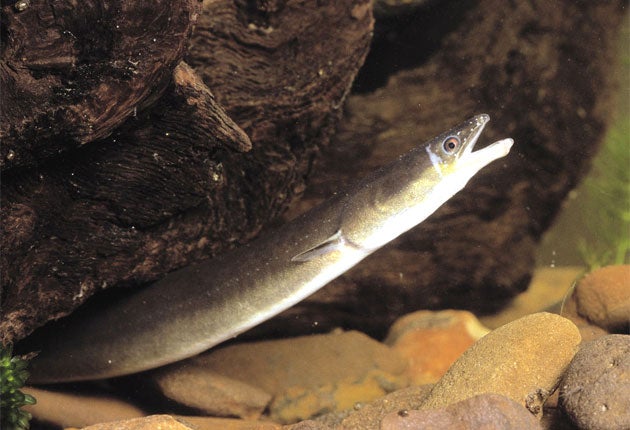Europe's eel stocks 'under threat' from export fishing
Conservationists fear France's supplies to China may jeopardise restocking plan

A campaign to save the eel, the continent's most threatened common freshwater fish, may be breaking down because French fishermen are exporting too many baby eels to China, British conservationists fear.
France holds up to 90 per cent of Europe's eels, and French supplies are crucial for restocking rivers and lakes in other countries from which they are rapidly disappearing.
But in the current fishing season, which runs for another two months, French fishermen plan to export a massive 14.5 tonnes of baby eels – elvers or "glass eels" – to China, where they can fetch the remarkable price of €800 per kilo. And in doing so, they may not be able to meet the restocking commitments which they have entered into under an EU rescue plan for the species.
Across Europe, populations of Anguilla anguilla are plummeting and, according to the International Union for the Conservation of Nature, the species is now critically endangered. Catches are down more than 75 per cent over the past 40 years and "recruitment" – the number of baby eels joining the stock – has dropped by more than 95 per cent compared with levels before 1980.
Once one of Europe's most familiar fish, in some places eels have gone completely. Only last month, the Zoological Society of London revealed that over the past five years, catches of eels in the River Thames – once an iconic staple of Cockney cuisine, as jellied eels or served in eel pies – had dropped by 98 per cent; fewer than 50 were caught in the river in 2009.
No one really knows why a creature which was once so common is now becoming so rare. The losses may be linked to its remarkable reproductive cycle, which involves the adults spawning on the far side of the Atlantic, but there are also many potential threats in home rivers, ranging from over-harvesting and pollution to the construction of dams making passage upstream impossible.
In response to the decline, the EU has brought in an eel recovery plan which takes effect this year, and one of its key components is that all countries which fish for eels are obliged to hold back a significant proportion of their catch to be used in restocking. This season the amount is 35 per cent, and this will rise annually until it reaches 60 per cent in 2015.
However, there is disquiet about the French fishery, the largest, from the wide range of British conservation interests concerned with saving the eel, who come together in the Sustainable Eel Group. They fear that the substantial amount of eels the French are exporting to Asia this year will not allow them to meet their restocking commitments – which will be vital for the rest of Europe – and the recovery plan will start to break down.
In 2007 the eel was added to Appendix Two of the Convention on International Trade in Endangered Species, which meant that its export trade was restricted. Britain immediately announced a voluntary export ban but French fishermen, some of whom depend on the catch for their livelihood, have negotiated an export quota of 14.5 tonnes – with each tonne representing some three to four million glass eels. Early estimates of the total French harvest this year suggest that the export quota will be much more than the amount which would allow the agreed percentage for restocking.
"It is highly likely that the 14.5 tonnes will absorb all the remaining catch in France, and short-term profit will triumph over sustainability," said Andrew Kerr, the Sustainable Eel Group chairman.
"The ultimate effect of this plundering will be to slow the recovery of the eel, by losing them from their natural European environment. French fishermen are being permitted to make large short-term profit through exports to China in priority over meeting their EU obligation to make 35 per cent of the catch available for restocking.
"Should France continue with these exports and fail to put aside the 35 per cent they could be subjected to EU infraction proceedings."
A spokesman for the French Ministry of Agriculture and Fisheries said last night that France was confident of meeting its 35 per cent restocking quota, adding: "The French plan is a very responsible plan, in which conservation of eels is the utmost priority. We are aware that, thanks to our management, we are now the only country in Europe with significant stocks of eels, and we hope that our quota of restocking will be able to contribute to a wider European restocking."
Subscribe to Independent Premium to bookmark this article
Want to bookmark your favourite articles and stories to read or reference later? Start your Independent Premium subscription today.

Join our commenting forum
Join thought-provoking conversations, follow other Independent readers and see their replies